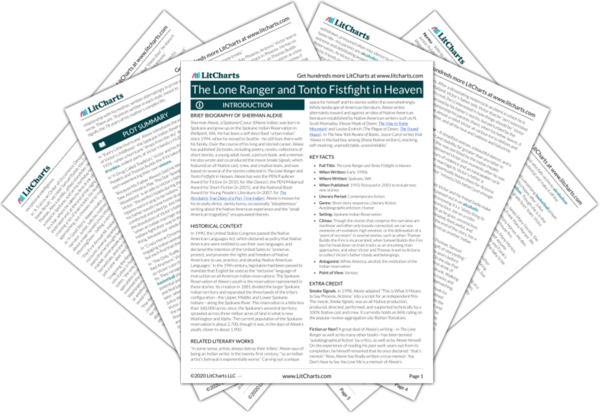Summary
Analysis
In January of 1979, a hurricane falls “from the sky [and onto] the Spokane Indian Reservation”; the storm wakes nine-year-old Victor from a nightmare. A third person narrator describes Victor’s experience; he is in the basement of his family’s HUD (department of Housing and Urban Development) issued house, while upstairs his mother and father host “the largest New Year’s Eve party in tribal history.”
The storm (or “hurricane”) in this story is both literal and metaphorical. As the weather system descends on the reservation, a storm of resentment, confusion, and anger—fueled by alcohol—rages through Victor’s parents’ New Year’s party. What should be a time of renewal ultimately cedes to old hurts and old ways.
Themes
From the basement, Victor hears an argument begin; two Indians, like “high-pressure and low-pressure fronts,” begin to fistfight one another. The music upstairs stops suddenly, frightening Victor. He can hear his father angrily ask what’s going on, and he can hear his mother reply that her brothers are fighting “again,” outside on the lawn. Victor runs to the window, from which he can see “his uncles slugging each other with such force that they had to be in love.”
Victor’s uncles are like the struggle between love and hatred personified. Alcoholism, past trauma, shared pain, familial resentment, and cultural confusion—all themes that will reign over Alexie’s characters throughout this entire story collection—are seen battling their way out of Victor’s uncles in this very early point in the narrative.
Themes
Victor can hear one of his parents’ guests yell “They’re going to kill each other,” but no one at the party takes any action. “They were all witnesses,” the narrator says, “and nothing more.” The fight intensifies for a few moments, then ends as abruptly as it began. Victor thinks of news footage of cities devastated by hurricanes, and wonders whether it is worse to have memories destroyed, or simply forever damaged.
Bearing witness, another theme important to the characters throughout Alexie’s stories, is an indictment here, as it is elsewhere in the collection. The passive watching that Victor’s parents’ party guests engage in is a danger in and of itself; it brings devastation, just like a storm.
Themes
Victor remembers a metaphorical “storm” four years earlier when his father, unable to purchase Christmas gifts for the family, wept. “We’ve got each other,” Victor remembers his mother saying, but claims that she knew “it wasn’t real.” A few weeks before Christmas, Victor had watched his father check his wallet repeatedly for money “as if the repetition itself could guarantee change.”
Victor’s father repetitively checking his wallet for money, though he knows he’ll find none, is a cyclical action that mirrors the cyclical form of a hurricane, and also the cyclical nature of so much cultural pain and devastation that occurs on the Spokane Indian Reservation.
Themes
Get the entire Lone Ranger and Tonto Fistfight in Heaven LitChart as a printable PDF.

Victor reflects on how he hates the rain. He used to be afraid that “he was going to drown while it was raining,” and his nightmares often feature drowning. He also dreams of swallowing other liquids besides water; “whiskey, vodka, and tequila, those fluids swallowing him just as easily as he swallowed them.”
Though Victor fears drowning in water, he is unafraid of drowning in alcohol; these substances have claimed the lives of so many of his relatives, and their claim on him is almost, even from a young age, uncontestable.
Themes
Victor’s uncles give up their fight completely and return to the party arm in arm. However, “the storm that had caused their momentary anger move[s] from Indian to Indian at the party, giving each a specific, painful memory.” The collective pain at the party grows and expands, and the drinking intensifies. Victor, back in bed, feels as if the basement ceiling above him is “lower[ing] with the weight of each Indian’s pain.”
Though Victor’s uncles’ fight ceases, their warring has gathered a storm-like strength; it continues to wreak havoc on the party, and themes of collective pain experienced on an individual and community level are introduced in its wake.
Themes
Victor gets out of bed and goes upstairs, hugs his uncles, and looks for his parents. He finds them “passed out” on their bed. He gets into bed between them, closes his eyes, and says his prayers. The party rages on. Victor closes his eyes and falls asleep. In the morning, in the wake of the hurricane, “all the Indians, the eternal survivors, gather to count their losses.”
Indians, “eternal survivors,” weather storm after storm, aware of the toll these “storms” take. Calling back to themes of witness-bearing and indescribable cultural pain, the “count[ing of] losses” is a rote action, and a passive one—but when it is all that can be done, it must be.
Themes












